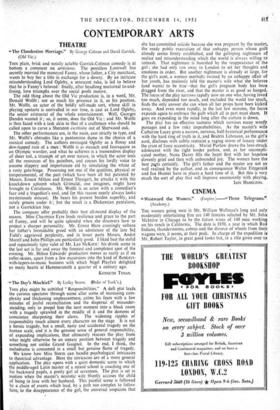"The Day's Mischief." By Lesley Storm. (4Duke of York's.) THIS
play might be subtitled "Responsibilities." A deft plot leads the curious spectator through scene after scene of increasing com- plexity and thickening unpleasantness, calms his fears with a few minutes of joyful reconciliation and the dispersal of misunder- standing, only to propel him the next moment into a bleak room with a tragedy sprawled in the middle of it and the demons of conscience sharpening their claws. The widening ripples of responsibility touch almost every character on the stage. It is not a heroic tragedy, but a small, nasty and accidental tragedy on the human scale, and it is the genuine sense of general responsibility, of expanding implications, that ultimately rescues the play from what might otherwise be an uneasy position between tragedy and something not unlike Grand Guignol. In the end, I think, the melodrama is consumed in a small but genuine flame of tragedy.
We know how Miss Storm can handle, psychological intricacies to theatrical advantage. Here the intricacies are of a more general application. The play opens with a quiet domestic scene in which the middle-aged Latin master of a mixed school is coaching one of his backward pupils, a pretty girl of seventeen. The plot is set in motion when the master's neurotic wife bluntly accuses the child of being in love with her husband. This painful scene is followed by a chain of events which lead, by a path too complex to follow here, to the disappearance of the girl, the universal suspicion that she has committed suicide because she was pregnant by the master, the ready public execration of that unhappy person whose guilt already seems firmly established, and the galloping nightmare of malice and misunderstanding which the world is always willing to unleash. That nightmare is banished by the reappearance of the girl ; she had only run away to London to set her thoughts and emotions in order. But another nightmare is already at large, for the girl's aunt, a woman morbidly twisted by an unhappy affair of her youth, has zealously told the master's wife what she believes (and wants) to be true—that the girl's pregnant body has been dragged from the river, and that the master is as good as hanged. The focus of the play narrows rapidly now on one who, having loved too much, depended too much, and excluded the world too much, finds the only answer she can when all her props have been kickexf away. And even more rapidly, in the last few minutes, the focus expands again to embrace the guilt which all in part must share. II goes on expanding in the mind long after the curtain is down.
The play has an effective tautness which survives many wordy passages and a few risky improbabilities. As the master's wife Catherine Lacey gives a narrow, nervous, half-hysterical performance with the hard ring of truth in it, and Beatrix Lehmann, as the girl's aunt, discloses with subtle restraint a raging storm of lunacy under the crust of fussy eccentricity. Muriel Pavlow draws the love-struck adolescent with the right tender pathos, and, as her uncompli- cated mother, Nuna Davey fills the heart first with her hopeless slovenly grief and then with unbounded joy. The women have the best 'Arts certainly. The girl's father and the master are not so well realised by the author, and in consequence Walter Fitzgerald and Ian Hunter have in places a hard time of it. But this is very, much the sort of play that will improve enormously with playing.
LAIN HAMILTON.






































 Previous page
Previous page